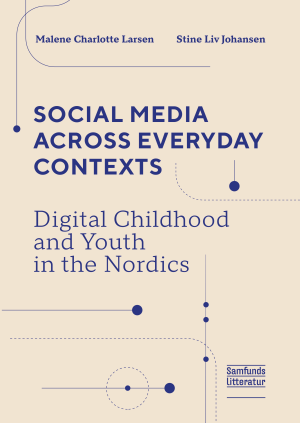More than anywhere else in the world, social media platforms are integrated into everyday life in the Nordic welfare states. This book examines the role of social media in the everyday lives of children and young people in the Nordics. Through a practice theoretical lens, the book offers a nuanced examination of the complex relationship between children, young people and social media.
The book covers themes related to play, learning, social relations, identity, self-presentation, sexuality, gaming and datafication, and discusses these themes in the light of ongoing debates, including current as well as future ethical considerations. The book is co-authored by associate professors Malene Charlotte Larsen and Stine Liv Johansen, who both have extensive research experience in the field of social media and digital childhood and youth. The book includes contributions from guest authors, each possessing significant expertise in specific areas related to the overarching topic.
Social Media Across Everyday Contexts – Digital Childhood and Youth in the Nordics is relevant for students and practitioners with an interest in children and young people’s digital media use.



